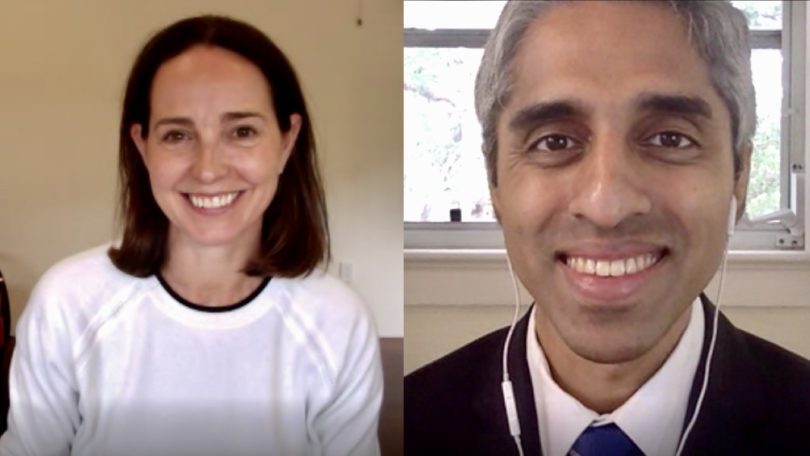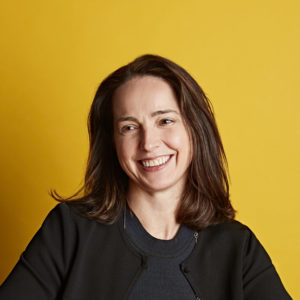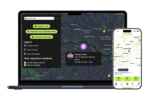Nextdoor CEO Sarah Friar and former Surgeon General Dr. Vivek Murthy discuss the healing power of human connection during a global pandemic.
The top recommendation on my reading list in 2020 is likely one of the most important books of the year, as well. The author, Dr. Vivek Murthy, became Surgeon General of the United States in December 2014 planning to focus on obesity, diabetes, and opioid addiction in America. Yet after a substantial listening tour, going out and meeting people across the nation, he found another insidious disease in our midst. Loneliness. It changed his focus and legacy as Surgeon General, and became the subject for his latest book, Together: The Healing Power of Human Connection in a Sometimes Lonely World.
Recently, Dr. Murthy joined a video call with me to discuss the importance of community and witnessing the strength in neighbors during the coronavirus outbreak. Here are some edited highlights from our conversation:
Sarah: Just as your book Together is about to launch, a global pandemic erupts. Tell me what is going through your mind.
Dr. Murthy: When I was writing the book, I never would have predicted that we would so quickly be in a moment like we are now, where we were being asked to physically distance ourselves from each other. What COVID-19 did is pull the curtain back on what our experience of loneliness is like. Almost overnight, many of us were left without the connections that we rely on. We were reminded that we really do need each other and that the relationships we have in our life are not just nice to have, but they are necessary.
As painful as it is and as much as I worry about loneliness deepening further, I think this is also a unifying moment. There’s an opportunity to build on that recognition of how important relationships are and to step back and recommit to making relationships our priority both now and after this pandemic is over.
We can make something extraordinarily positive out of this moment of pain.
Dr. Vivek Murthy
Sarah: Many are aware of what an economic recession is, but something you’ve talked about in the face of this pandemic is a social recession. Can you share more about that and why it’s important to consider right now as we prepare for the future?
Dr. Murthy: There has been a gradual slide toward a social recession over many years, and COVID-19 threatens to dramatically accelerate that.
To me, the antidote to a social recession is a commitment to living a people-centered life where we prioritize relationships. The people-centered society is one where we think about the impact on relationships and community when we’re designing public policy. We don’t just think about the financial impact of the law, we ask how it impacts our relationships. I think COVID-19 is giving us a jolt that can nudge us in that direction, but the real challenge will be to stay committed to that people-centered path long after the pandemic.
Sarah: What would your advice be at the neighborhood level to work toward more people-centered communities?
Dr. Murthy: Our relationships are one of our greatest stress relievers. In neighborhoods, building a greater connection doesn’t have to be complicated. It can be as simple as people going over to introduce themselves or inviting others over to their homes for a neighborhood gathering, like Sarah Harmeyer did with her neighbor’s table. These are very simple but powerful acts we can take in laying the groundwork for connection.
The second thing that can be powerful in neighborhoods is to create an opportunity for people to help each other. When I moved to DC, my wife and I lived in this condo building where people would pass each other in elevators as if they were complete strangers. We lived in that building for an entire year and didn’t know a soul. We eventually moved to another building that had a listserv so we could communicate with each other and start the very simple practice of asking others if they needed help. What was really extraordinary was to learn about our neighbors through their responses. We learned when somebody asked for advice related to child care that they were other kids in the building. From that, grew a weekly playdate. So I wouldn’t underestimate the power of creating a forum where people can ask and give help.
Then finally, I think communities should engage in acts of service together. Service shifts the focus from ourselves to someone else and reaffirms that we have value to bring to the world. If we look around right now, we’ll find that there are many opportunities to serve because there are many people struggling. We may have homeless populations in our neighborhood that need support and care. We may have food banks in our neighborhood that need volunteers. We might be able to come together and create materials that others may need. I’ve heard extraordinary stories about students and parents coming together in their neighborhoods to sell masks which they then deliver to hospitals and healthcare workers who need protection against COVID-19.
In trying to build greater connections, we’re not trying to transform ourselves into something we’re not. We’re trying to return in a sense to who we intrinsically are: interdependent creatures that were designed to depend on each other, work with each other, and live together.
Dr. Vivek Murthy
Sarah: What do the next few months look like for our neighborhoods? Do you think that shelter-in-place makes us more or less connected after the pandemic?
Dr. Murthy: It really depends on how we approach this moment. If we allow physical distancing to make us socially distant, I think it will weaken us and we will come out lonelier and more disconnected. But if we use this as a moment to step back and take stock of our lives, recognize just how important our relationships are, and recommit to investing in those relationships, I think our lives could look dramatically better when we come out of this.
Crisis is painful but there are opportunities. After World War II, the world came together to rebuild Europe and create a new world order. We used the pain and chaos of the Civil Rights Movement to build a new way forward in terms of how we look at race relations and how we reassert the idea that all people are in fact created equal. We can make something extraordinarily positive out of this moment of pain.
Sarah: What has been your favorite neighborhood moment during this time?
Dr. Murthy: I’m in Miami right now, where I grew up, with my sister and brother-in-law, grandmother, wife, and two small kids. As I walk around this neighborhood that I grew up in, whenever somebody else is walking the other direction, six feet apart, they wave. Quite enthusiastically! It’s almost like we’re hungry for human contact and I find myself waving back just as enthusiastically because I’m in the same boat with a shared desire to be connected. It’s been wonderful to see and it makes me feel good every time it happens.
In trying to build greater connections, we’re not trying to transform ourselves into something we’re not. We’re trying to return in a sense to who we intrinsically are: interdependent creatures that were designed to depend on each other, work with each other, and live together.
Despite all the restrictions we have around us, it’s in moments of crisis that we find out who we really are. During this pandemic, we have seen so many people demonstrate their compassion, kindness, and commitment to others often putting their own lives at risk. It’s what our doctors, nurses, and other local heroes have been doing to care for others, but we see it among neighbors as well and that to me is a beautifully poignant and reassuring reminder of who we really are.
To connect with your local neighborhood, please login at www.nextdoor.com.
For more like this, follow @Nextdoor on Twitter, Instagram, and Facebook.





I feel lucky to live in a village and neighborhood where I truly feel that the neighbors, and village are caring for us and each other to the best of their ability. Thank you to Glenwood and the citizens who live here.
No one is s island during ugly dark days of pandemic!! Buy stocks panic creates opportunity
I enjoyed this article very much. I agree. I have felt a comforting connection from this Website, from people I don’t even know. I have met a couple of them, though.
I’ve lived in Greenville for 10 years. Coming from a much bigger city, I’ve enjoyed living where people are friendly. I’m handicapped, and I can’t tell you how many citizens have been kind enough to help me over the years, so, believe me, people around here practice what you preach,
Absolutely this is the time to be there for each other.
Support reaching out to your neighbors.
We are all in this together.
Im thankful for the blessed neighborhood I live in . Pandemics would make anyone pray and come together. So as humans who are created to socialize , there’s no new normal you learn to adapt. Nextdoor is and should only be about true loving neighbors helping others they dont know.
I believe it true humans cannot stand isolation right now some humans suffered depression this quarantine enhanced the depression some humans will consider terminate themselves that suffering another week of quarantine suicide a long term solution for a short term problem sad
I am very happy be part the community, i have been doing my part to contribute any way in this time , lockdown in my home with a healthy issue i have a strength to fight ( not Covid-19 ) and started sewing a cloth face mask For marin Hospital for free ,came me the inspiration and now i still doing that to service my community i am proud offer that and thankful for all who purchased they send me many blessings and comments they like the mask and feel comfortable to wear . I hope everyone is safe and healthy
Very good reading! I must tell you, i am so thankful for my neighbors in Hazelwood! Amy & Adam and family, Sharon & husband. Just to have someone say hello how are you doing, the first 2 months of the quarantine helped me so much to get through it. God says He will never leave us nor forsake us He gives us kind, caring neighbors too! They are always extending a helping hand! Thank you neighbors! And sometimes all it takes is a simple hello!
Enjoyed the article and inspiration connection thru Nextdoor is powerful. Thank you for the information and again the spirit of “connecting with one another”.
Sincerely,
Patti ND Tampa Fl.
im greatily surprise of my kendale miller neighborhood and my zip code 33193
Great interview. I saw Dr. Murthy speak about his (then upcoming) book the first week of Mar.
Probably one of his last in person appearance before SIP. He is such a calming force to learn from, and his timing for sharing his message couldn’t have been more perfect.
Very amusing! Life doesn’t work that way.
I am so thankful for my neighbors from everything from picking up items at the grocery store to bringing healthy meals over when my husband came home from the hospital with a stroke. Neighbors watching out for each other from crime in the area to helping one other. I am very thankful for you all, God’s Blessings br upon all of you!
We are so blessed here in Lima NY! Neighbor looking out for neighbor. Each neighborhood keeping an eye on those with needs. Distant friends keeping in touch.
During the pandemic my husband and I have been doing a lot of gardening and one of our joys is to talk to the many neighbors walking by. However, there have also been deeper connections as with giving plants away to neighbors or doing energy healing on a child that had just fallen on my sidewalk. Shew was really hurting and fighting back her tears. After checking with her mom and her I did some pain relief and energetic balancing on her (keeping the 6 foot distance). To her surprise, the blood stopped and her pain was gone-yeah! If anybody wants to learn to do that I will be happy to teach you to do the same. Everybody can learn to do energetic healing. I have been teaching in this country and in Germany for over 25 years and have helped many people to improve their quality of life.
Muhammad Mustafa
Like you, I enjoy gardening. I really do grow different types of fruit ( fig, pears, blue berry.
etc.) and vegetables. – Asian bean, butternut squash, pumpkin, tomatoes, egg plant,
cucumber, Asian pumpkin (Loaki) etc. I enjoy sharing my vegetables and fruits with my
neighbor) . I have been teaching in this country over 35 years.
I heard the Doctor in an episode of NPR’s Hidden Brain too. Thank you for the reminder to slow down. It’s difficult for me because people are literally dying and I become impatient with the selfishness of others. It doesn’t help that we have a divisive administration on top of this horrible pandemic. I think one has to be superhuman not to feel a bit of anger and concern…but we can always try to be mindful of our impact.
I wish we had more people like Dr. Murthy to steer us through these challenging times, with a good balance of scientific discipline and empathy for our fellow beings.
I love Nextdoor. I love it when we help one another. Bolster each other UP. Let’s keep politics and ugliness out. Inclusiveness and opportunity to unite in!
Alia Betts, Kailua-Kona, Big Island of Hawaii.